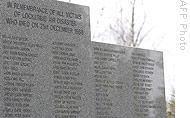London
27 October 2009
 |
| A memorial stone for the victims of Pan-Am flight 103 iin a garden of remembrance near the village of Lockerbie, Scotland, Nov. 2008 |
It's been 21 years since the American plane exploded over Lockerbie, Scotland and now Scottish officials are reopening the case. Libyan Abdel Baset Ali Al-Megrahi was the only person convicted in the bombing. Scottish authorities released him in August. Pamela Dix's brother Peter was one of the victims of Lockerbie. She has mixed feelings about Scottish authorities reviewing the criminal investigation. "I do have a concern that the criminal investigation may get in the way of a decision to hold a full public inquiry," she said.
Dix and some other family members say British officials have in the past used the Scottish criminal investigation as an excuse to not hold a public inquiry which they see as their best chance to find out how Lockerbie was allowed to happen and who was responsible. Prosecutors have always said that al-Megrahi wasn't acting alone.
"It's important to understand that Lockerbie could only be carried out by some sophisticated form of communication and conspiracy with at least a number individuals probably state sponsored and to date we have no answers to the questions of who was responsible, what was the motivation of it, what lay behind it, and who ordered it," she said.
"I am a lawyer trained in the law of Scotland. I have taught the law of Scotland for 40 years. I have practiced the law in Scotland. I have been a judge in Scotland. And it is my professional opinion that on the evidence led at the trial Abdel Baset Megrahi was wrongly convicted. It's a question of law. It's not a question of opinion or of counting heads. It's a simple question of law," said Robert Black, a professor of Scots law and observed al-Megrahi's trial.
The Scottish Criminal Cases review commission backs him up. In 2007 it issued a ruling giving six reasons why there is reason to believe that al-Megrahi was wrongly convicted. Al-Megrahi had been planning an appeal, but he dropped it just before he was released, opening the door for a possible public inquiry. Black says both the legal and political establishment in Scotland don't want an inquiry because they're afraid of what it will turn up.
"It will turn up misconduct on the part of the prosecutors at the trial and it will turn up the fact that as this independent investigative body has said, that no reasonable court on the evidence led, could have reached the decision that this court did," he said.
Many American victims' families disagree. They were outraged at al-Megrahi's release, and consider the case closed. But the Reverend John Mosey, whose 19-year-old daughter Helga was killed in the bombing, has his own idea who might be guilty. "Having attended the whole trial except maybe one and a half weeks in Poland, ten months, I came away feeling that, still feeling that, the Palestinian group- the PFLPGC and Ahmed Gabril, protected by the Syrians and financed by Iran, were guilty, but we can't prove that at this point," he said.
Dr. Jim Swire is the father of a woman killed in the bombing. He thinks the bomb was planted at London's Heathrow airport, not in Malta as prosecutors alledged. He points to a break-in in Heathrow's baggage area hours before Pan Am flight 103 left London. "When you add that to the fact that the plane that took off, and was blown up, took off and was loaded completely at the Heathrow Airport. And quite apart from the fact that I myself took a copy of the Lockerbie bomb on board a British Airways plane at that same airport in 1989 and wasn't stopped from doing so and flew to America with it. It seemed to us very obvious that there were major, major flaws in security at that airport," he said.
The news that Scottish authorities are pursuing possible new evidence in the case came as UK families of Lockerbie victims delivered a letter to Prime Minister Gordon Brown asking for the public inquiry every former British government has denied them. Britain's foreign minister said this week if there is any question of an inquiry, it will be up to Scotland to address it.